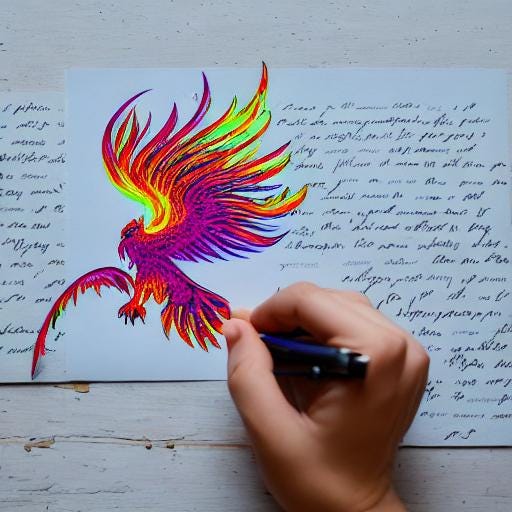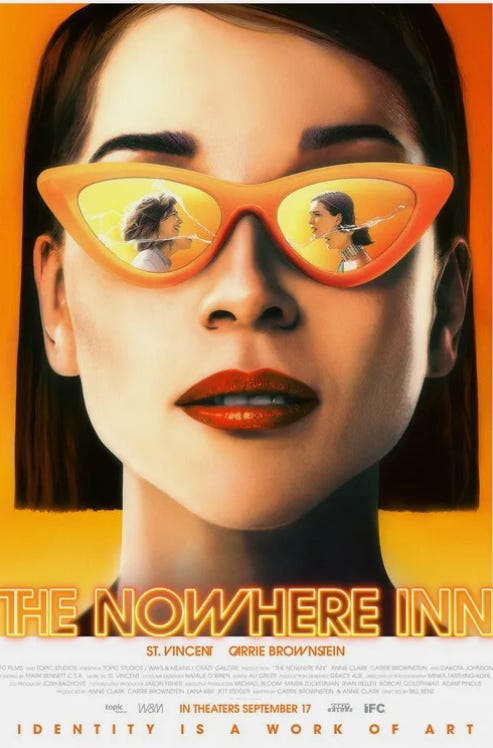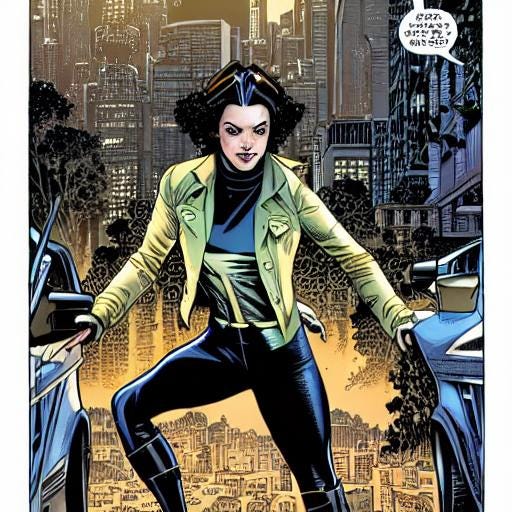On Motivation, Identity, & the Grammys
Are we all really just brands in the shape of human beings?
On Motivation

I’ve been on the hunt lately for that elusive wellspring of motivation.
Without it, as a writer, creation ceases. And then I am left in a state of not truly feeling myself. Drab and dry. No ink left in the pen.
This is a problem, as I’ve also realized: if I am not creating something healthy, I will create something unhealthy.
Perhaps in its most subtle form, unhealthy creations come in the simple package of negative thinking, fear, lack of motivation.
It seems the mind and heart have to do something with themselves; they have to fly out and land somewhere.
Might as well do your best to direct the path of flight and make that somewhere a good landing place, somewhere you want to stay for awhile. Until it’s time to move on to the next great thing.
I fortunately found some inspiration (motivational fuel) listening to episodes of the podcast Song Exploder, where in each episode an artist discusses the creative journey behind a single song. Song Exploder has also been turned into a Netfix documentary series.
As I listened to various episodes, I compiled a list of 3 motivating principles that stood out.
All artists—even the most prolific and famous—experience times of self doubt and fear of failure. I’ll say that again in a different way. Some of the most talented creators struggle deeply with the act of creation.
Well, what do they do then?
Often in these moments, through contemplating these feelings rather than seeking to escape them, the artist grows stronger and creates something truly honest and powerful—a phoenix rises.
It’s the story behind the struggle that others resonate with. When an artist embraces such difficulties, they often inspire song.
Sometimes a single song can take years to come together. When it stalls out, it often reignites through opening up to collaborative spirit, where the main artist allows their art to be refined by another artist, someone they respect and trust.
The concept of creating together—especially when stumped—shows the power of a creative community and how creativity is a fire that feeds off itself—one fire that is lit up brightly will spark another.
All forms of art—music, poetry, anything—comes from a human being, from a spark of humanity. This artist also has a life outside of the particular artform they are known to practice. They have family, friends, hobbies. It is humans who make art.
Humanity is what connects us. And it is what inspires both the artist and the observer. This is the “be you” principle Jon Batiste often speaks of.
Be you, because it helps inspire others to feel comfortable being them.
These are my favorite episodes with one motivational prompt I gained from listening to each:
🎧🎧🎧
Episode 114 St. Vincent “New York”
Annie Clark (St. Vincent), a guitar player guitar world calls one of the 20 best guitarists of the decade, says the song “New York” from her fifth album is the first song she wrote that she felt could actually be someone’s favorite song.
It’s a song she says “that goes straight to the heart,” where she set aside her “guitar player ego” and everything was done in support of the song.
Prompt: Look over previous work that feels unfinished. Ask yourself what needs to happen to support the work. What sense of ego can be eliminated to help propel the piece towards the poem, story, etc, it is on the path to becoming.
Listen to “New York” by St. Vincent.
🎧🎧🎧
Episode 146: Janelle Monáe “So Afraid”
This episode is laced with motivational quotes. Monáe shares how delving into anxiety and fear, and her experiences growing up, toughened her.
Yet, in the song, she explores her own vulnerability instead of focusing on the things that have hardened her. Monáe says discussing vulnerability and insecurities inspires her—there is power in admitting we are afraid.
Prompt: Isn’t lack of motivation just a form of fear of failure. Fear I can’t produce something of worth? Fear of moving forward? Take a moment to admit your vulnerability—see if this helps you move through and beyond it.
Listen to So Afraid by Janelle Monáe.
“I think that openly talking about fears keeps us connected. I feel so much more inspired and encouraged to move forward when someone is telling me about their imperfections. … vulnerability—there is so much power in it.”
—Janelle Monáe
On Identity
If you haven’t noticed, St. Vincent—or should I say, Annie Clark—has been on my mind.
To clarify, Annie Clark is the name of the artist who makes and performs music under the name St. Vincent. In case you haven’t noticed, I like her.
These two personas—people—are different, but the same. Right?
In case you want to go on an identity journey with Annie, I mean St. Vincent, this concept is explored to it’s dark and laughable end, in the hallucinogenic mockumentary called “The Nowhere Inn” (currently available on Hulu).
The mockumentary was co-written by Annie Clark and her real life friend Carrie Brownstein, who is best known for her role as co-writer and star in the series Portlandia.
Without any real spoilers, “The Nowhere Inn” portrays a loveable, kind and very normal, Annie Clark. But the characters in the film seem to find Annie much less interesting than her stage presence, St. Vincent. This all comes to light as Brownstein directs and pieces together a documentary about Annie/St. Vincent.
I think you are starting to understand where this is going.
The mocumentary format invites inquiry into who Annie/St. Vincent truly is. Lots and lots of inquiry.
How is a person different from what they create?
Is a person as an artist different from who they are as a friend, lover, daughter, mother?
What about who the person is in their private life versus their public life versus their social media life?
Are we all really just brands in the shape of human beings walking around in a constant state of self promotion?
Unfortunately, yes!
The film takes an obsessive dive into personal identity where egos clash and personal boundaries blur into dreamlike abstraction.
Sounds fun, yeah?—Some people take drugs for this kind of thing.
The film is fun if you like crazy weird, which I do, but the truth is we all play different roles in life.
Adam is a father, a writer, a Realtor, a husband, a son, a weirdo.
I do not have a stage name after a saint. But if I did, It would just be one more part of myself I would try to integrate and love.
We all have our private and our public lives, and sometimes they are expressed differently.
But in the end, a rock star is a person. With feelings, family, fears, ambitions. All of the same things us non-stars have, too.
This is why we love the art our favorite artists make—the very best art, writing, creation is that which celebrates what it is to be alive as a human: the bad, the good, the personal, the everything—the experience.
This is one thing—being human—we can all bond on.
All of us weirdos are kind of the same thing.
(By the way, St. Vincent has won 3 Grammys)
The 2024 Grammys
For the first time, maybe ever, my family watched the Grammys from start to finish. We made a pact: if we were to do this, we would take it for what it was and not, for lack of better words, bash any of the artists based on our own musical preferences.
I think we succeeded.
I’d score us at about a 93 percent. I’ll share a little criticism at the end of this section, but promise not to be too hard on anyone in particular.
Here are three positive takeaways from the experience:
In all three of these examples, the music industry really did do a good job at honoring and respecting those artists who came before, serving as inspirations for the younger, new artists.
For example, Luke Combs and Tracy Chapman duetted Chapman’s “Fast Car.” It began with the telling of a touching story about “Fast Car” as a childhood favorite Combs’ dad would play for him while driving in his truck.
More than once during the performance, Combs looked over at Chapman adoringly with a sense of awe, like he was still a kid looking up to a hero. It was moving to see them playing this song together, which clearly touched them both.
Listen to the original Fast Car by Tracy Chapman.
Listen to the remake by Luke Combs.
At 80 years old, in her first Grammy performance, Joni Mitchell shared the stage with a group of talented artists and put on quite the impressive rendition of “Both Sides Now.”
To me, this was the most moving moment of the night. I didn’t cry, but I thought about thinking about crying.
Artists who shared the stage with her included Brandi Carlile, Lucius, Allison Russell, Sistastrings, Jacob Collier, and Blake Mills.
Listen to “Both Sides Now” Live at BBC Oct 9, 1970
Billy Joel, no youngster, received a lot of love for coming back after decades with no new material, and writing and performing his new song “Turn the Lights Back On.”
I am happy to report, he sounded great. Check out the unlikely story about what motivated Joel to write his new song in the clip below.
One Criticism
This criticism is more about modern music than the Grammys. I’m going to just pose a question about the use of Auto-Tune and similar pitch-altering technologies that many artists use in their vocals.
In general, I am not against this, and believe there is a time and place for most things. But when it comes to artists who sing with their natural voices the majority of the time as compared to artists that use high amounts of Auto-Tune when singing—is one technically, classically more artful, or higher quality than the other?
Just asking the question. One more question to ponder: With AI on the rise, and all of us afloat in a digital universe that is ever expanding in technological advancements, is what is human, more real, less processed, less robotic, increasing in value in today’s cultural marketplace?
Here is an article by Pitchfork that is everything and more than you would ever want to know about Auto-tune.
Weekly Word
Figured this one is a deep-dive into this name already, so why not?—let’s learn about saints and islands.
Saint Vincent—
Island of the British West Indies in the central Windward Islands population 99,750 (from Merriam-Webster.com)
The patron saint of charitable societies, St. Vincent de Paul is primarily recognized for his charity and compassion for the poor, though he is also known for his reform of the clergy and for his early role in opposing Jansenism. (from Britannica.com)
St. Vincent de Paul has become known as the “The Apostle of Charity” and “Father of the Poor.” His contributions to the training of priests and organizing parish missions and other services for the poor shaped the Church’s role in the modern world. (from https://ssvpusa.org/)
So why does Annie Clark go by the name, St. Vincent?
In an interview on The Colbert Report, she said that she "took [her] moniker from a line in a Nick Cave song" that referred to the hospital where Dylan Thomas died: "And Dylan Thomas died drunk in / St. Vincent's hospital" (from Cave's song "There She Goes, My Beautiful World," from the 2004 album Abattoir Blues / The Lyre of Orpheus).
The name is also a reference to her great-grandmother, whose middle name was St. Vincent. (From Wikipedia)









im amazed at the thoughtfulness on your thorough posts. no simple feat...